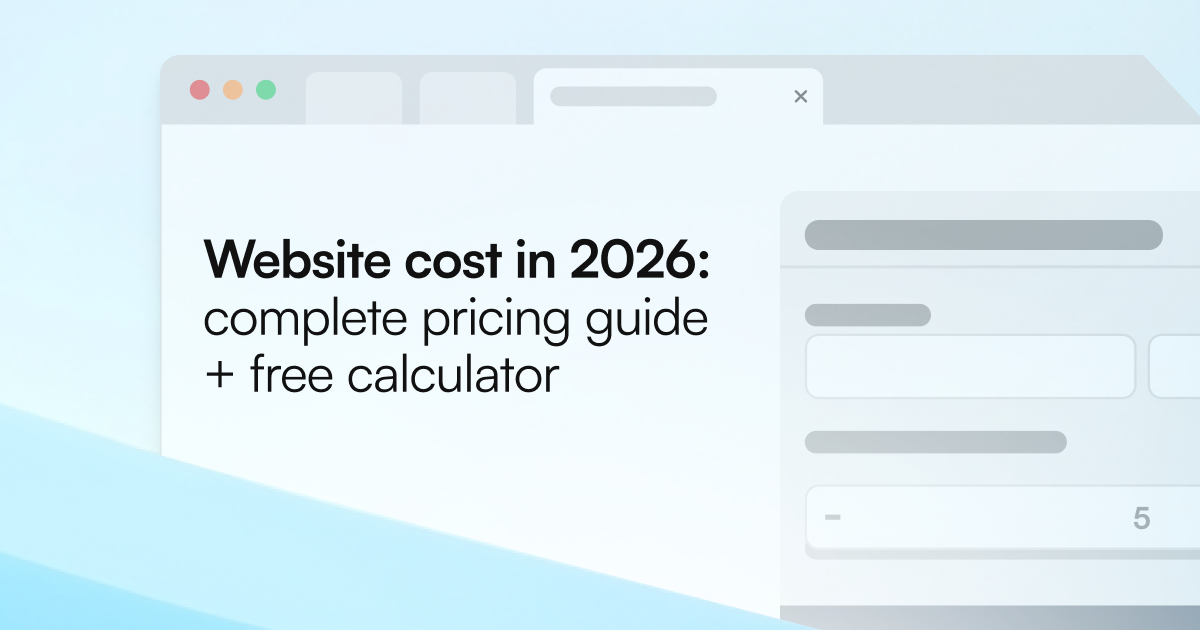

Designow subscription
Ognjen Marinkovic
8 min read
April 7, 2025
Quick Answer
Your website shapes how visitors see your brand. First impressions form in 0.05 seconds. 94% of trust cues are design-related. Good design boosts SEO, increases conversions by up to 200%, and works on mobile (62% of all traffic). Bad design kills credibility before visitors read a word. Design isn't decoration - it's conversion infrastructure.
Your website is your digital storefront. It's often the first thing people see about your business.
If your site looks outdated, confusing, or slow, visitors leave. They don't give you a second chance. They go to a competitor whose site looks more trustworthy.
Great design builds trust, makes navigation easy, and drives conversions. It affects your SEO rankings, mobile experience, and ultimately your revenue. This post breaks down 10 data-backed reasons why website design matters - and what it costs when you get it wrong.
For detailed website cost planning, see our pricing guide.
Why website design is important
Your website is your digital storefront. It's often the first thing people see about your business.
If your site looks outdated, confusing, or slow, visitors leave. They don't give you a second chance. They go to a competitor whose site looks more trustworthy.
Great design builds trust, makes navigation easy, and drives conversions. It affects your SEO rankings, mobile experience, and ultimately your revenue. This post breaks down 10 data-backed reasons why website design matters - and what it costs when you get it wrong.
For detailed website cost planning, see our pricing guide.
1. First impressions happen in 0.05 seconds
Visitors form an opinion about your site in 0.05 seconds. Faster than a blink. 94% of first impressions are design-related. Not your content. Not your offer. Your design. Source: CXL
This means: if your website looks outdated, messy, or confusing, visitors leave before reading a single word.
A modern, clean design immediately communicates:
- Professionalism
- Attention to detail
- Reliability
You don't get a second chance at a first impression
2. 94% of trust cues are design-related
When people visit your website, they decide whether to trust you based on how it looks, not what it says. 94% of trust-related first impressions are design-based. Source: Business Dasher
If your site has:
- Cluttered layouts
- Low-quality images
- Broken links
- Inconsistent fonts
Visitors assume your services or products are equally unreliable.
A well-designed site signals you're serious, capable, and trustworthy. Trust is essential - especially for businesses relying on online sales, consultations, or lead generation.
3. Good design improves usability
A beautiful website isn't enough. Usability keeps people engaged.
Good design means:
- Simple layouts
- Clear menus
- Easy-to-read fonts
- Intuitive navigation
When visitors can find what they need quickly, they stay longer and take action.
A confusing website frustrates users. Frustrated users leave.
User experience (UX) should drive every design decision. If it looks great but doesn't work, it fails.
4. Design affects SEO rankings
Good website design and strong SEO go hand in hand.
Google measures how users interact with your site:
- Bounce rate: Do visitors leave immediately?
- Time on site: Do they explore multiple pages?
- Mobile-friendliness: Does it work on phones?
A well-designed website:
- Loads faster
- Keeps users engaged
- Encourages exploration
All positive SEO signals.
Source: Cloudflare
Clean design also means:
- Better mobile performance
- Easier indexing by search engines
- Lower bounce rates
Want to see how much design costs? Check our website design cost guide.
5. 62% of traffic is mobile
Mobile traffic accounts for 62% of all web traffic. Source: Statista
If your website doesn't work smoothly on mobile devices, you're losing more than half of potential customers.
Responsive design is mandatory. Your website must:
- Adapt to different screen sizes
- Have tappable buttons (min 44x44px)
- Display readable text without zooming
- Load images quickly
A mobile-friendly site improves:
- User experience
- SEO rankings
- Conversion rates
Mobile-first design isn't optional anymore.
6. Speed impacts conversions
Speed matters. A lot.
A 1-second delay in page load time causes a 7% reduction in conversions. Source: BigCommerce
People expect instant access. If your site loads slowly, visitors leave - often to a competitor.
Speed optimization includes:
- Optimized images (WebP format)
- Quality hosting
- Caching
- Clean code
Fast websites:
- Convert better
- Rank higher in SEO
- Keep visitors engaged
Every second counts. Literally.
7. Consistent Design Builds Brand
Strong brands are built on consistency.
Using the same colors, fonts, icons, and tone across your website reinforces your brand identity. It makes you memorable and trustworthy.
Inconsistent design:
- Confuses visitors
- Weakens your message
- Looks unprofessional
Brand consistency creates emotional connections with your audience - crucial for long-term loyalty.
Design isn't decoration. It's communication.
8. Better Design Increases Sales by 200%
According to Forrester, a good user interface can boost conversion rates by up to 200%. Source: Forrester
Clear calls to action, easy navigation, attractive product pages, and smooth checkout processes directly impact revenue.
Great design:
- Removes obstacles
- Guides user journey
- Encourages action
Every design decision should support the path from curiosity to commitment.
For context on design costs: one-off design starts at $1,999, or get unlimited design with our $2,999/month retainer.
9. Your site must work everywhere
Users switch between devices constantly:
- Browse on phone during coffee break
- Switch to tablet at home
- Finalize purchase on laptop
Your website must look great and work well on all devices and browsers.
Testing across platforms ensures a smooth experience no matter how visitors find you.
Use:
- Responsive design
- Progressive enhancement
- Cross-browser testing
A solid design framework works everywhere.
10. Good design makes you competitive
You have competition. Even in niche markets.
Visitors often open multiple tabs and compare options before deciding. If your competitor's website looks more professional, modern, and trustworthy - even if their offer is slightly worse - they win.
A polished website positions you as the better choice before you even speak to the customer.
Design is competitive advantage.
Want to compete? Most startups overpay for design. We help you get professional design without agency bloat.
Summary
Website design isn't about looking pretty. It's about building trust (94% of first impressions), improving SEO, and increasing conversions (up to 200%). Your site is your digital storefront. Bad design costs you customers. Book a call to get it right.
FAQs
In 0.05 seconds. 94% of that first impression is design-related, not content.
Poor visuals hurt credibility immediately. A clean, modern look signals reliability and professionalism to visitors.
Mobile devices drive 62% of web traffic. If your site doesn't work on mobile, you lose more than half of potential customers.
A 1-second load delay cuts conversions by 7%. People expect instant access - slow sites lose sales.
Yes. 94% of visitors judge your trustworthiness based on design. Bad design = lost customers before they even read your offer.






